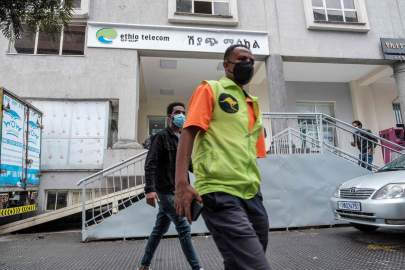U.S.-China Tech Fight Opens New Front in Ethiopia

A U.S.-backed consortium beat out one financed by China in a closely watched telecommunications auction in Ethiopia—handing Washington a victory in its push to challenge Beijing’s economic influence around the world.
The East African country said Saturday it tapped a group of telecommunications companies led by the U.K.’s Vodafone Group PLC to build a nationwide, 5G-capable wireless network. The group had won financial backing for the multibillion-dollar project from a newly created U.S. foreign-aid agency.
The agency offers low-interest loans, but the financing comes with a condition: The money won’t be used to buy telecom equipment from China’s Huawei Technologies Co. and ZTE Corp. Washington considers both a spying threat, an accusation the companies deny.
The losing bidder was South Africa’s MTN Group Ltd. , whose proposal was financed in part by a Chinese investor.
The telecom license auction in Ethiopia took on wider geopolitical significance amid heightened competition between the U.S. and China over key technological pursuits, from the rollout of 5G to chip manufacturing.
“The U.S. and China are fighting a proxy war in Ethiopia for influence,” said Zemedeneh Negatu, chairman of Fairfax Africa Fund LLC, a U.S.-based investment firm that focuses on Africa.
After all but shutting out Huawei in the U.S., Washington has become more assertive about challenging Beijing’s economic footprint overseas. It is using new financial tools to win influence and ensure that strategic assets in foreign countries stay in friendly hands.
Johannesburg-based MTN, the continent’s largest telecommunications company and a longtime customer of Huawei and ZTE, said it made its bid in partnership with China’s Silk Road Fund, which has investments from Beijing’s China Development Bank and the Export-Import Bank of China.
Backing the Vodafone bid was the International Development Finance Corp., or DFC. The U.S. government-funded agency was created in December 2019 with a goal of offering alternatives to cheap Chinese financing for foreign infrastructure projects.
Ethiopia’s government, which wants foreign investment and competition to improve its often-patchy cellular service, had the option of accepting both bids, only one or none. “This marks the beginning of a new era in our country,” the Ethiopian Communications Authority tweeted Saturday after announcing the winning bidder.
The DFC in late 2020 approved offering up to $500 million in U.S. loans if the Vodafone-led group won the bid. It isn’t obligated to move forward with the transaction, however. The U.S. has separately been pressing Addis Ababa to let humanitarian groups access Ethiopia’s Tigray region, where a violent conflict has led to what the U.S. calls ethnic cleansing.
Ethiopia late last year sent in federal troops, accusing the dominant political party there of trying to divide the country. A representative for Prime Minister Abiy Ahmed didn’t respond to a request for comment.
The DFC said Friday, before the auction results, that it is working closely with other U.S. government agencies to monitor the situation in Tigray and “will carefully consider its impact on any potential financing of the Vodafone consortium.”
Should the financing go ahead, the U.S. loans would carry interest rates well below those of commercial banks. The idea is to help the carrier buy equipment from non-Chinese suppliers, such as Ericsson AB, Nokia Corp. or Samsung Electronics Co. Their equipment is often more expensive than Huawei or ZTE hardware, according to wireless executives and U.S. officials.
U.S. law also prohibits its loan from being used to buy Huawei or ZTE equipment, though one person familiar with the matter said it is possible the Vodafone-led bid could still buy some Chinese gear because of the project’s size and cost.
In the past two decades, Ethiopia has developed commercial bonds with Beijing, signing loan agreements with Chinese lenders that total $13.7 billion between 2000 and 2018, according to the China Africa Research Initiative at Johns Hopkins University. About $3 billion of that went to telecom-infrastructure projects with ZTE and Huawei.
Ethiopia, meanwhile, is also an important U.S. strategic ally because of its location near the Red Sea, on the Horn of Africa. The U.S. has tried to neutralize terrorist groups, including al Qaeda and Islamic State, in the region.
Source: https://www.wsj.com/articles/u-s-china-tech-fight-opens-new-front-in-ethiopia-11621695273




